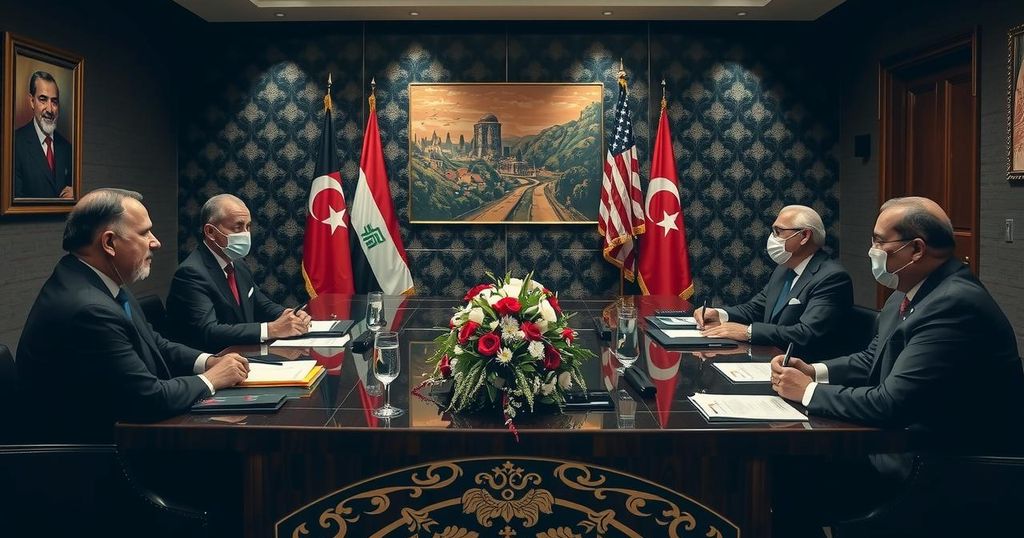World news
ABU DHABI, ARAGHCHI, ASIA, BASHA, CONFLICT, DAMASCUS, EMIRATI, HAYAT TAHRIR AL - SHAM, HEZBOLLAH, HTS, IRAN, IRANIAN REVOLUTIONARY GUARDS, IRNA, ISRAEL, MIDDLE EAST, MOHAMED BIN ZAYED AL - NAHYAN, REVOLUTIONARY GUARDS, SYRIA, SYRIAN CIVIL WAR, SYRIAN CONFLICT, TEHRAN, UNITED ARAB EMIRATES, WAR
Daniel O'Connor
0 Comments
Iran’s Foreign Minister Visits Syria Amidst Islamist Insurgent Offensive
Iran’s foreign minister plans to visit Damascus to reaffirm support for President Bashar al-Assad amidst a significant challenge posed by Islamist insurgents who have captured Aleppo. This visit underscores the ongoing alliance between Iran and Syria as tensions rise in the region. The Syrian regime’s dependency on foreign support reflects the complexities of the conflict, with external influences from the U.S., Russia, and Israel exacerbating existing challenges.
Iran’s foreign minister, Abbas Araghchi, is scheduled to visit Damascus amidst escalating tensions as the Syrian government confronts a significant challenge to its authority following a substantial offensive by Islamist insurgents capturing Aleppo. This visit aims to reaffirm Tehran’s support for President Bashar al-Assad’s regime, underscoring the critical alliance that has been pivotal in Assad’s ongoing struggle against opposition forces. Araghchi emphasized, “We firmly support the Syrian army and government,” indicating Iran’s unwavering commitment to backing Assad’s leadership.
The offensive spearheaded by Hayat Tahrir al-Sham (HTS) has disrupted the tenuous stability in the region, prompting concerted efforts by Assad to reestablish control. Recent communications between Assad and his regional allies suggest a strategic response to regroup and launch countermeasures against the insurgents. The Syrian president reassured Emirati President Mohamed bin Zayed al-Nahyan that his government is adequately supported by its allies to withstand the insurgency and reclaim lost territory.
Over the years, the Syrian regime has relied heavily on foreign support, especially during critical confrontations like the 2016 Battle of Aleppo, where Russian aerial assistance was decisive. Iranian ground forces, including members of the Iranian Revolutionary Guard, have also played crucial roles in bolstering Assad’s military capabilities. In contrast, Israel has intensified its air operations against Iranian interests in Syria, citing rising tensions between the two nations.
The recent capture of Aleppo by insurgents has raised concerns among Assad’s international backers, as indicated by discussions between Russian foreign minister Sergei Lavrov and Araghchi, who both expressed profound alarm over the escalating situation. Araghchi attributed the insurgents’ gains to external pressures from the United States and Israel, an assertion that the U.S. National Security Council dismissed, stating that HTS had been designated as a terrorist organization.
In response to the retreat of Syrian forces from the region, Turkish-backed rebels and Kurdish militias seized opportunities to expand their territorial claims. Video footage from Kuweires airbase revealed Turkish-backed forces taking control, further complicating the landscape. Meanwhile, reports suggest that the Syrian military has initiated a counter-attack as they reinforce their positions in anticipation of further militant advances.
Amidst the chaos, airstrikes from Syrian and Russian forces have escalated, reflecting the ongoing conflict’s intensity. Civil defense agencies have reported casualties in Idlib due to these aerial assaults, underscoring the dire human toll of the continuing violence in Syria.
As the situation develops, the outcomes of these conflicts may significantly impact the broader geopolitical dynamics in the region.
This article provides a critical overview of the precarious situation in Syria following the recent surge of Islamist insurgents capturing significant territory, including Aleppo. The Syrian government’s reliance on foreign support, primarily from Iran and Russia, has been central to its military strategy since the onset of the civil conflict. The latest developments reflect the complexities of international alliances and the evolving balance of power within Syria, exacerbated by external influences from countries such as the United States and Israel. Understanding the historical context of Assad’s regime and its relationship with foreign allies is essential to grasping the current turmoil and its implications for regional stability.
In conclusion, the ongoing offensive by Islamist insurgents poses a formidable challenge to the Syrian government’s authority, compelling Iran to reaffirm its backing of President Bashar al-Assad. The strategic implications of these developments indicate a heightened urgency for regional powers to reassess their roles and alliances amidst escalating violence. The involvement of external actors like the U.S., Russia, and Israel complicates the situation further as the Syrian conflict continues to evolve, influencing broader geopolitical dynamics in the Middle East.
Original Source: www.theguardian.com




Post Comment